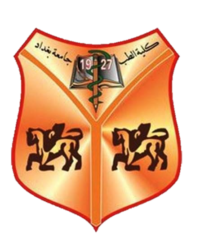Curriculum Description
This course description provides a necessary summary of the most important characteristics of the course and the expected learning outcomes for the student to achieve evidence of whether they made the most of the available learning opportunities. It must be linked to a description of the program.
General Description
| Category | Details |
|---|---|
| Name of Organization: | Baghdad College of Medicine |
| Departments: | Pathology, Anatomy, Physiology, Internal Medicine, Biochemistry |
| Module Name: | Systematic Module (Hematology Division) |
| Course Pattern: | Large and small group lectures, laboratories, online teaching, team-based learning, hospital visits |
| Semester and Year: | 1st Year / Semester 2 |
| Total Course Hours: | 8 practical hours + 26 theoretical hours |
Goal of the Course
The goal of the course is to help students build primary and basic knowledge about normal Anatomy, Histology, Embryology, Physiology, Biochemistry, and Medicine of the blood. In addition to interpreting all with related clinical correlations through presenting the most important and the most common hematology-related diseases. The course also defines the basic components of blood cells and focuses on the knowledge of the normal histology and function of blood and bone marrow. Students will discuss the metabolism of Iron and study Iron deficiency anemia.
Outcome of this Module
A. Cognitive and Theoretical Goals:
- List the components of the blood and describe the types of blood cells.
- Describe the structure of the bone marrow and stages of hemopoiesis.
- Identify and describe the structure of the lymphoid organs (lymph nodes, thymus, tonsil, and the spleen).
- Identify the function of the blood.
- List the structure of hemoglobin, its types, and hemoglobin synthesis.
- Describe the iron metabolism in the human body and its importance.
- Enumerate the causes of iron deficiency anemia.
- Describe briefly the diagnosis and treatment of Iron deficiency anemia.
- Explain the pathogenesis and diagnosis of G6PD deficiency.
B. Skills:
- Outline the important hematological parameters and the blood cell count.
- Describe the different types of blood groups and cross-matching tests.
- Describe the coagulation mechanism and the factors involved in this mechanism.
Methods of Learning
- Large and small group lectures
- Laboratories
- Online teaching
- Team-based learning
- Hospital visits
Methods of Assessment
- Theoretical exams by multiple-choice questions
- Theoretical exams by essays based questions
- Practical exams as slides
- Interacting exams by INLE website
Values and Sentimental Goals
- Learning through scientific discussions
- Importance of respecting time and accomplishing tasks within time limits
- Learning from discussion and clinical reasoning
- Communication with the patient
General and Qualifying Skills
All teaching staff in this course/module strive to keep pace with development and modernity, in addition to the special need of circumstances in order to provide scientific information and lectures in a way that facilitates the educational process and makes it more likable. Almost all the course's instructors worked - almost - to learn and develop e-learning skills to overcome difficulties and achieve all the previously mentioned goals.
Infrastructure
| Week | Topic | Hours |
|---|---|---|
| 1st Week | 10 theoretical lecture hours about histology of lectures and assessment exam and 18 practical hours of laboratory slides and exam | 28 hours |
| 2nd Week | 10 theoretical lecture hours about physiology of and assessment exam and 20 practical hours of laboratory slides and exam | 30 hours |
| 3rd Week | 9 theoretical lecture hours about medicine and biochemistry of lectures and assessment exam and 6 hours of integrated learning activity in addition to assessment exam | 15 hours |
Course Books Required
- Histology: Junqueira's Basic Histology, De Fiore's Atlas Of Histology
- Physiology: Guyton & Hall-Textbook of Medical Physiology
- Biochemistry: Clinical Chemistry and Metabolic Medicine by Martin A. Crook
- Medicine: Davidson-Principles & Practice of Medicine, Oxford-Handbook of Clinical Medicine
Main References (Sources)
- Same as above
Recommended Resources
- INLE Iraqi network learning environment
- Electronic references: All references related to hematology
Course Development Plan
- Editing lectures and some of the clinically related subjects are subjected almost each year. However, most of the knowledge in this module is basics; hence, changes are usually minor. More interactive lectures are planned to be introduced electronically in accordance with the current Covid-19 pandemic situation.

